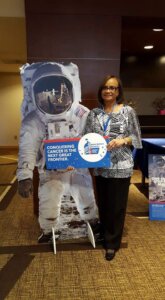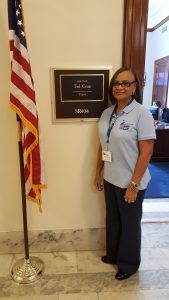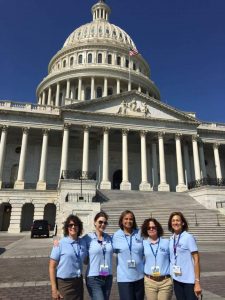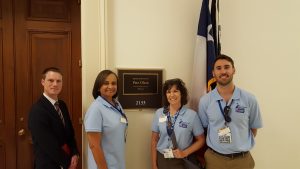ACS CAN Leadership Summit & Lobby Day
- September 11, 2016
I, along with 610 volunteers attended the ACS CAN Leadership Summit & Lobby Day in Washington, D.C. on September 11-14, 2016. There was representation from 50 states.
In 2016, cancer will kill 8.2 million people; 5 million of those will occur in low and middle income countries around the world. The incidence of cancer is projected to grow as country populations age, and exposure to risk factors such as tobacco use, unhealthy diets and physical inactivity continues to increase.
During our Lobby Day we asked Congress to: 1) Increase funding for cancer research at the National Cancer Institute (NCI) by $680 million. To ensure that the research being supported today yields the cancer treatments of tomorrow. Congress must sustain and expand the support it is currently providing. 2) Support the Palliative Care and Hospice Education Training Act (HR 3119 / S 2748). Palliative Care improves quality, controls cost, and enhances patient and family satisfaction for the rapidly expanding population of individuals with serious or life threatening illness. Palliative care is a relatively new medical specialty, and more must be done to ensure patients and providers understand the benefits of palliative care and that an adequate palliative care workforce is available to provide the comprehensive symptom management, intensive communication and level of coordination of care that addresses the episodic and long-term nature of serious and chronic illness. And 3) Support the Removing Barriers to Colorectal Screening Act (HR 1220/S 624). Colorectal Cancer is the second leading cause of cancer death in the U.S. and a cause of considerable suffering among the 135,000 adults diagnosed and nearly 50,000 who die each year from this devastating disease. Routine recommended colonoscopies are suppose to be a a free preventive service. However, seniors on Medicare are required to pay 20 percent coinsurance if a polyp is removed during the procedure. Waiving cost-sharing for polyp removal during screening colonoscopy for seniors on Medicare may help to close the gap in health disparities among low and moderate income seniors and the medically underserved.
None of us are more than One Degree from someone with cancer – whether it is a friend or family, or ourselves directly. Conquering Cancer is the next great frontier. Eliminating death and suffering from this disease means everything to the millions of Americans with cancer and the people who love them.




